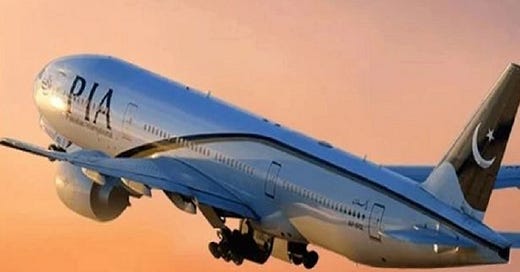PIA’s Russian Fiasco Dampens Hopes For The Speedy Creation Of Alternative Financial Channels
The Pakistani state presumably has access to the same currency swap with China that its businessmen are using to continue trade with Russia as revealed by Islamabad's ambassador to that country earlier this month so it’s all the more confusing why it wasn't employed by state-controlled PIA to pay Moscow's overflight charges.
State-controlled Pakistan International Airlines (PIA) rerouted a Toronto-bound flight from Islamabad last week after Russia refused to allow access to its airspace until that country pays overflight charges. This fiasco dampens hopes for the speedy creation of alternative financial channels between those two that’s a requirement for Pakistan to import discounted food and fuel from Russia like Islamabad has once again signaled interest in doing after sending mixed signals about this for the past two months since the post-modern coup against former Prime Minister Khan in early April.
Pakistani Ambassador to Russia Shafqat Ali Khan revealed in early June that some of his country’s businessmen were already employing a currency swap with China in order to continue conducting business in Russia so it’s unclear why state-controlled PIA couldn’t do the same to pay Russia its overflight charges. This observation suggests that everything isn’t proceeding as smoothly behind the scenes in this respect as those countries’ well-wishers had hoped, which makes one wonder what’s really going on.
That South Asian state is suffering from an ultra-painful economic crisis that’s prompted questions about its attendant food and fuel security, which is why it’s such a necessity to slash its import bill as soon as possible by clinching the discounted deals that former Prime Minister Khan was on the cusp of reaching with Russia before his ouster. Absent this outcome, which requires the speedy creation of alternative financial channels between them that’s clearly come across some unexpected obstacles as proven by PIA’s Russian fiasco, Pakistan’s recovery will remain uncertain.
It might be useful for concerned Pakistani citizens to respectfully seek clarification about this process from their authorities by asking them about this on social media. Journalists from that country should also consider investigating what’s going on behind the scenes and try to receive some insight about this from inside sources even if the latter prefer to remain unnamed due to the issue’s sensitivity. There’s obviously something wrong if PIA couldn’t utilize the same currency swap with China that its Ambassador to Russia revealed was already in effect earlier this month for continuing business there.
The Pakistani state presumably has the same access to this aforementioned swap as their country’s businessmen do so it’s all the more confusing why it couldn’t pay Russia’s overflight charges through this workaround. That might ultimately translate into trickle-down costs for passengers, which could in turn make it financially prohibitive for expats to return home from Canada as regularly as they’ve been doing. These same expats who the issue more immediately affects would do well to think about taking the lead in respectfully requesting clarification from their authorities like the author suggested in this article.
All well-wishers of the Russian-Pakistani partnership that was on the brink of becoming strategic right before former Prime Minister Khan’s superficially “democratic” overthrow hope that alternative financial channels will be created between these two sooner than later. It’s with this best-case scenario in mind that the author is passionately appealing to Pakistanis, their Canadian expat community, and that country’s journalists to do what’s needed in order to put peaceful pressure on their authorities to prioritize this process as soon as possible.




